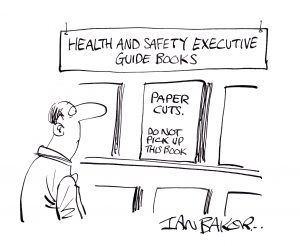Historical research doesn’t seem, on the face of it, to be a risky activity. Compared with mining, deep-sea pearl fishing, mountain rescue or identifying mysterious biological agents it isn’t – obviously. But there are physical risks, and here are just some of them.
1. Lifting Heavy Boxes and Volumes
Manual handling training is compulsory for archivists and librarians who need to move heavy boxes or books from awkward spaces. Researchers would save themselves lots of grief with slipped discs and twisted knees if they had some too.
2. Research Posture
 The thing about research is that when you get absorbed in it, you don’t notice the time ticking by. And then suddenly you discover you’ve been stuck in the same position at your desk for hours on end, and that you can’t feel your feet any more. I’ve written about this before. Anyone who has stood bent over the huge parchment membranes of the Chancery or Exchequer rolls at the National Archives at Kew for days on end will know what a pain this is. Literally.
The thing about research is that when you get absorbed in it, you don’t notice the time ticking by. And then suddenly you discover you’ve been stuck in the same position at your desk for hours on end, and that you can’t feel your feet any more. I’ve written about this before. Anyone who has stood bent over the huge parchment membranes of the Chancery or Exchequer rolls at the National Archives at Kew for days on end will know what a pain this is. Literally.
3. Paper Cuts

I’m not joking about this. Cutting yourself on paper edges, or a rusty pin or clip, is a real hazard when handling old documents. And if the cut gets infected then that can become very, very nasty indeed: I know at least one person who was hospitalised as a result of just such an incident. Up to date tetanus jabs are recommended, as is going to the doctor as soon as any such cut becomes inflamed.
4. Dust, Dirt and Spores
A well-kept archive or library repository should be clean. But sometimes the sheer scale of a collection means that individual items are dusty, particularly if they were boxed in a dirty state and that box has not been opened for many years. If the collection care team hasn’t got round to brushing down the contents then you’re at risk of breathing in some nasties – dust, dirt and fungal spores. If you are prone to asthma or other allergies, this can be a problem. And some researchers and conservators find that this sensitises them to other things as well; anecdotally, there are more food allergies and dermatitis among those groups than others. The solution is to carry a paper mask with you on research trips, and to wash your hands regularly (making sure you don’t get contact dermatitis from the cheap soap in the reading room loos).

